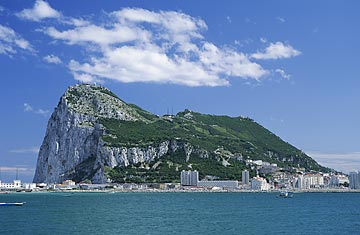
The island of Gibraltar.
As instances of reconciliation go, it lacks the momentous significance of the Camp David talks. But when Spanish Foreign Minister Miguel Ángel Moratinos sits down for trilateral talks with his British and Gibraltarian counterparts on July 21, it will represent a small milestone in a centuries-old conflict. For the first time in 300 years, a Spanish minister will set foot on the Rock.
"It's a historic moment," says Alejandro de Valle, a professor of international law at the University of Cádiz in Spain. "And it meets a deep need."
Ever since the 1713 Treaty of Utrecht gave Britain sovereignty over the craggy outcrop that juts from the southern edge of Andalusia, Spain has been trying to win Gibraltar back. And Gibraltar, which has voted to maintain British sovereignty, isn't happy about it. Over the centuries, the conflict has taken the form of a handful of failed sieges, a 1960s appeal by Spain to the U.N. to include Gibraltar in its decolonization measures, and endless expressions of outrage over everything from docked nuclear submarines to a visit from Princess Anne. The 2006 creation of a Tripartite Forum for Dialogue among the governments of Spain, Britain and Gibraltar has reduced the levels of hostility, but only slightly.
Just how slightly was made clear when Moratinos' visit was nearly canceled over the thorny issue of territorial waters. The longtime dispute — Britain claims the first three nautical miles around the peninsula, while Spain holds those waters to be its own — flared anew in May when the European Commission, at Madrid's behest, designated some of those waters as a marine conservation area under Spain's jurisdiction. Gibraltar appealed the decision, decrying it as a breach of international law and warning that it threatened to upset plans for the upcoming Tripartite meeting (dialogues previously took place in Granada and London). "This is an additional banana skin thrown by Spain at the feet of the [negotiations] process," declared Gibraltar Chief Minister Peter Caruana.
Caruana hardly furthered the meeting's cause himself, however, when one week before its scheduled start, he issued a public statement reminding local boat owners that despite the European Commission's environmental ruling, Spain has no police jurisdiction in Gibraltar's waters and so "all requests by Spanish authorities within British Gibraltar Territorial Waters to board vessels ... should be refused." The call to what some Spaniards saw as open rebellion threw the talks into disarray; the Spanish press reported on Thursday, July 16, that diplomatic sources saw little likelihood of the meeting's going ahead.
But by late Friday, it was back on again. A source within the Spanish Foreign Ministry declined to say how exactly the issue was resolved, but Dominique Searle, editor of the Gibraltar daily the Chronicle, believes Spain took a pragmatic approach. "It's my impression that they refused to change the demarcation [of waters] but agreed that they wouldn't act upon it."
De Valle believes that kind of pragmatism is exactly what is needed from the Tripartite Forum talks, whose program includes discussions of visas, financial regulations, education and, yes, the environment. "There's an absolute void there, so when you have a catastrophe like the New Flame [a cargo ship that collided with an oil tanker and sank off the Gibraltar coast in 2007], any initiative by anyone only produces more conflict," he says. "In that sense, any agreement that comes out of the talks will be better than what there is now, which is nothing."
Pragmatism may also well influence the reception Moratinos receives when he becomes the first Spanish Foreign Minister to visit Gibraltar since Don Diego de Salinas and his downtrodden troops surrendered to British forces in 1704. Although one political party on the Rock has urged locals to fly the British and Gibraltar flags as a display of their "inalienable right to self-determination," Searle doesn't expect much in the way of open hostility. "In the end, the meeting came on short notice," he says. "And we're very deep into summer."
